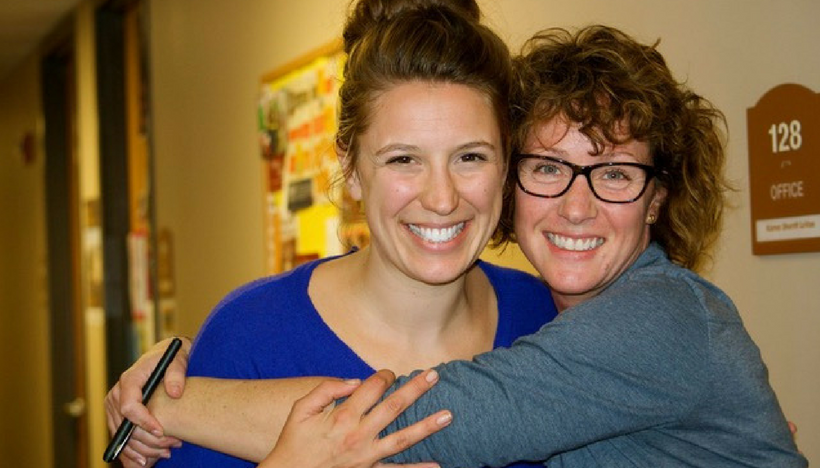This post was written by members Marissa E. King and Karen Sheriff LeVan.
Classrooms and especially student writing conferences should be places that champion student effort, celebrate writing growth, and promote student self-advocacy. Yet in the age of standardized testing and rushed observations, struggling writers often lose out. A focus on finished product can crowd out student voice and overlook intentions. After all, it’s faster and easier to mark an error than to uncover the thinking that led to the misuse of evidence or a faulty appositive.
For students, the results can be frustrating. Student writers often complain bitterly that teacher feedback doesn’t adequately value their work. One student described wanting to give up on writing after a frustrating conference with her teacher. In a harried but well-meaning move we too might make, her teacher pointed to a particular verb and instructed the student to “think about word choice here and revise” before moving on to suggesting other changes. The student had spent a great deal of time considering verb choice already. She knew exactly why she chose that verb, and yet her intentions did not shine on the page.
To help students advocate for the often-invisible work they’re doing, we need a clear structure to draw attention to the thoughts behind the errors. The student complaining about the teacher’s commentary on her word choice had chosen a word that didn’t make sense to the teacher reader. While the student wanted credit for her intention despite the error, there’s no way a teacher could understand the thoughtfulness behind the word choice without student explanation.
To prioritize space for student voice in conferences, we ask students to self-annotate their writing prior to showing teachers their work. Now, instead of sitting silently and feeling misunderstood, students use their annotation to make a case for how they meet each assignment expectation.
We ask students to mark and comment on their writing with two types of self-annotation:
1) actual markings (underline, bracket, circle) with labels identifying corresponding rubric components, and
2) brief notes explaining how the writing meets expectations or functions in the identified capacity.
A student might underline “on the other hand” and then write “transition shows contrast between my dad’s perspective and my own,” thus marking, labeling, and explaining all at once.
With marks indicating where students see their writing successfully meeting an assignment’s expectations, students get the chance to advocate for the thinking they’ve already done.
The student frustrated by her teacher’s “think about word choice” comment can underline her verb, mark it as “strong signal verb,” and then note that it “shows a resistant attitude.” The verb still won’t make sense to the teacher reader but now, the student has a chance to showcase what she did know, despite a result that isn’t clear to the teacher.
Self-annotation offers a chance to self-advocate in the face of error. Consider the student who starts her topic sentence with the introductory phrase: “Wiens, Kyle, CEO of an online repair company, admits. . . .” Although she uses a signal phrase (win!), the author’s name is inverted. Her annotation “fulfills MLA guidelines” and asserts her identity as a thoughtful, intentional writer. At the same time, her annotation turns the conversation to the thinking behind a mistake (Sheriff LeVan 2017). Instead of resorting to a breezy “correct this” comment, the teacher can respond to the student text and intention.
Annotation-driven conferences begin with the writer’s intentions. When students get used to making the case for the thinking behind their writing choices, both students and teachers win. As students self-annotate, they clarify their thinking. Instead of passivity, they enter conferences with annotations as their own self-advocacy agendas. Their annotations serve as the foundation to celebrate effort and growth despite error.
 Karen Sheriff LeVan teaches literature and writing courses at Hesston College in central Kansas. She currently researches and writes about the struggle for words in the 5th-grade classroom, college writing culture, and older adult creative writing groups. @KSLeVan
Karen Sheriff LeVan teaches literature and writing courses at Hesston College in central Kansas. She currently researches and writes about the struggle for words in the 5th-grade classroom, college writing culture, and older adult creative writing groups. @KSLeVan
 Marissa E. King teaches 5th grade in Tulsa, Oklahoma, where she overuses sticky notes, forgets to drink her coffee while it’s still hot, and writes with her students. She’s also a 2017 Yale National Fellow. @KingMarissaE
Marissa E. King teaches 5th grade in Tulsa, Oklahoma, where she overuses sticky notes, forgets to drink her coffee while it’s still hot, and writes with her students. She’s also a 2017 Yale National Fellow. @KingMarissaE

